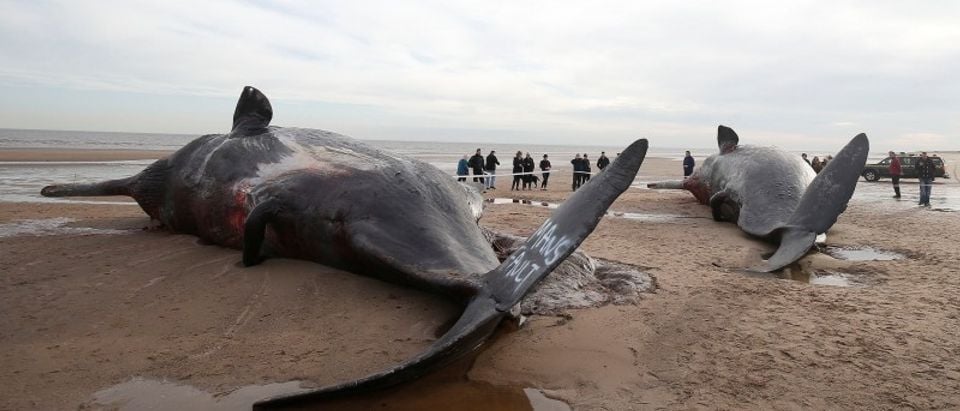Dead whales are washing ashore on the East Coast at a disturbing clip. But many radical environmentalists, purported friends of the poor sea creatures, are hard at work deflecting blame from the possible culprit – the late surge of offshore wind farm development in the Atlantic.
Lobstermen and commercial fishermen are the favored scapegoat of the dark money environmental lobby. The scapegoating campaign these well-heeled entities and their regulator allies are waging threatens coastal New England towns with the social and economic calamity that characterizes the region we once called coal country.
There have been almost 20 “large whale strandings” on the east coast since Dec. 1, according to the National Oceanic and Atmospheric Administration (NOAA). It’s too premature to assign blame to any particular cause. But at this early stage, we cannot discount the possibility that turbine construction or sea floor surveys—conducted by bouncing sound waves off the ocean floor—are hurting the whale population.
After all, New York and New Jersey have invested aggressively in offshore wind farms in recent years, prompting a surge of development near the very coastline where whale carcasses are turning up. Just this month, another three dead whales were recovered near a Virginia wind farm in one week alone.
Despite these disturbing trends, Biden environmental regulators are obsessively targeting lobstermen, citing the supposed threat they pose to endangered whales. An environmental agency has closed much of the Massachusetts lobster fishery until late April on that basis. The same agency crafted a draconian whale protection plan binding lobstermen in Maine. The plan would close much of that state’s fishery for months at a time and effectively mandate pricey and untested rope-less trapping technology most lobstermen simply cannot afford.
The lobstermen are fighting these regulations in court. Their only hope of relief is a hearing before the U.S. Court of Appeals for the D.C. Circuit this Friday.
Biden regulators started targeting lobstermen because a coalition of powerful environmental fronts sued them, arguing federal law required regulators to protect whales by cracking down on commercial fishing. The Center for Biological Diversity led that coalition. In private, the CBD strikes a different note about offshore wind farms and endangered whales.
As the Daily Caller News Foundation reported in January, the Center for Biological Diversity conceded that wind farm development could be harmful to whales in a private letter to lawmakers. Though mindful of the threat wind farms may pose, the CBD nonetheless strong-armed regulators into coming down hard on lobstermen through their lawsuit in federal court. Their strategy is obvious – pin whale deaths on lobstermen to protect wind farm development, and the ESG funds and foreign corporations bankrolling green energy.
Sadly, regulators and woke environmentalists are all too willing to sacrifice working people in pursuit of their utopic objectives. We see the consequences in Kentucky and West Virginia, where dispensaries, pawn shops, and big box stores testify to the hardship and dysfunction that followed the Obama-era war on coal.
This is coastal New England’s future if the attack on lobstermen succeeds. The lobster industry generates $1 billion in revenue for Mainers alone and supports thousands of jobs. In remote, maritime towns, the lobster supply chain is the whole of economic opportunity.
Green social engineers trying to remake our society have never heard of the coastal towns that the industry sustains like Friendship (pop. 1142) or Beals Island (pop. 700). More importantly, lobstering forms the social fabric of these charming locales. Lobstering is an iconic business of neighbors and families, passed down through the generations in small towns steeped in maritime history. The composition of Maine’s lobster fleet reflects these facts. About 90 percent of the fleet consists of small owner-operator vessels less than 40 feet in length, worked by individuals or small crews of two or three, according to the Maine Lobstermen’s Association.
And these men and women know what they’re about. Despite four centuries of commercial fishing, Maine’s lobster resource remains robust. It’s proof of the ethic of conservation lobstermen cultivated long before regulators and activists with no ties to their community set upon them.
As the responsible stewardship of the lobstermen prove, we can protect coastal towns, lobster jobs, and whales by rejecting faddish energy alternatives that threaten all of them.
Daniel Turner is the founder and executive director of Power The Future, a national nonprofit organization that advocates for American energy jobs. Contact him at daniel@powerthefuture.com and follow him on Twitter @DanielTurnerPTF
The views and opinions expressed in this commentary are those of the author and do not reflect the official position of the Daily Caller.


